By: Prof. Siddiqui Mohd. Mahmood | Hyderabad
From a vision to reality, from a dream to a dynamic institution—Maulana Azad National Urdu University (MANUU) has emerged as a shining example of how education can uplift communities, preserve culture, and prepare students for the global stage.
Established in 1998 by an Act of Parliament, MANUU was created with a unique and noble purpose—to provide higher, technical, and professional education through the Urdu medium, especially to the marginalized Urdu-speaking population of India. The university was a response to the long-standing educational needs of a community that was rich in culture and literature but lacked access to mainstream professional education in its mother tongue.
This bold idea was strongly supported by Bharat Ratna and former Prime Minister Shri Atal Bihari Vajpayee, who believed in the power of inclusive education. His vision was to ensure that every Indian, regardless of their language, region, or background, could access quality education and participate equally in the nation’s development.
More than two decades later, MANUU stands tall as a Central University of national importance—a hub of academic excellence, cultural preservation, and social transformation. From its green and vibrant campus in Hyderabad to its 33 off-campus centers across India, the university has become a lifeline of hope and opportunity for thousands of students—especially first-generation learners.
From a modest beginning to a growing national presence, Maulana Azad National Urdu University is a story of dreams realized, barriers broken, and futures built. It is a celebration of the Urdu language, Indian diversity, and the transformative power of education.
In the words of Maulana Azad, “A country that cannot provide education to all its citizens will never truly progress.”
MANUU is making that progress possible—one student, one family, and one community at a time.
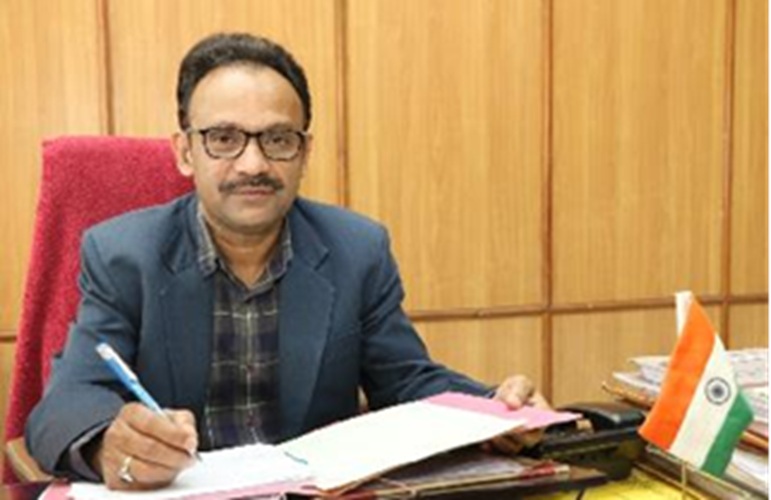
A University with a Purpose
MANUU is not just another university—it was built with a mission to empower through education, especially those who often find themselves left out of the mainstream system. Its key goals include:
- Promoting Urdu language: Preserving and fostering the rich heritage of Urdu Culture & literature
- Providing modern, vocational, and technical education: Democratising skill development and professional preparation
- Reaching students across India through regular and distance mode: Wider access to higher education programmes to diverse communities
- Encouraging women’s education, especially from conservative or rural backgrounds by empowering them to contribute meaning fully to the society.
What sets MANUU apart is its focus on quality education with values. The university believes that education should not just be about degrees—it should build character, confidence, and a sense of community and Nation.
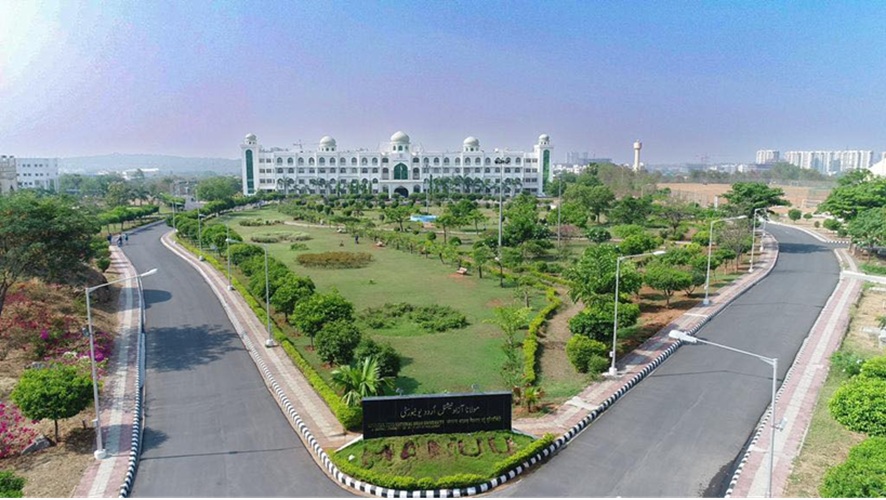
MANUU has A Campus That Inspires: Where Tradition Meets Transformation
Spread across a beautiful 200-acre green landscape near Hyderabad’s Hi-Tech City, Maulana Azad National Urdu University (MANUU) offers much more than a typical university experience. The peaceful yet vibrant campus sets the perfect tone for students’ academic journey and holistic growth.
MANUU is home to a wide range of academic programs spread across eight Schools of Studies and 24 departments, offering over 80 programs including undergraduate, postgraduate, diploma, certificate, M. Phil, and Ph.D. courses. These schools include:
- School of Languages, Linguistics & Indology (Departments of Urdu, English, Hindi, Arabic, Persian, Translation Studies)
- School of Commerce & Business Management (Departments of Commerce & Management)
- School of Mass Communication & Journalism
- School of Arts & Social Sciences (Islamic Studies, History, Economics, Political Science, Public Administration, Sociology, Social Work, Women’s Education)
- School of Sciences (Mathematics, Physics, Chemistry, Botany, Zoology)
- School of Education & Training (including nine off-campus teacher education colleges)
- School of Computer Science & Information Technology
- School of Law: the winds of progress have stirred through school of law which has recently risen on campus, pledging a brighter tomorrow through enlighten lessons of equality and equity and justice (offering legal education and research).
Each department is designed to promote deep academic inquiry, linguistic development, and professional excellence in Urdu and multiple other languages, supporting MANUU’s multilingual and multicultural ethos.
The university campus boasts state-of-the-art infrastructure that supports learning inside and outside the classroom. Modern academic blocks and seminar halls are equipped with digital tools and host regular academic interactions, workshops, and cultural activities. Students enjoy residential life in well-furnished hostels—separate for boys and girls—while faculty and staff benefit from spacious residential quarters on campus.
A major attraction is the Saiyid Hamid Central Library, which houses an extensive collection of books, rare manuscripts, journals, and digital resources in Urdu, English, Arabic, Hindi, and Persian. It is a haven for scholars and readers alike. Additionally, the campus includes sports fields, a yoga and wellness centre, canteens, a shopping complex, with all basic facilities in subsidised rates and transport facilities, ensuring a smooth and enriched campus life.
The university also runs several special centres that bridge heritage with modern academic and professional needs. These includes
The Centre for Urdu Cultural Studies engaged in preserving and promoting rich Urdu cultural heritage
Centre for Deccan Studies with the aim of connecting Deccan culture to the global culture (Think Globally, Act Locally)
Centre for Information Technology and Innovation to ensure digital revolution in academics and administration
Centre for Professional Development of Urdu Medium Teachers for preparing 21st century teachers with CPD activities.
These centres host activities, seminars, and training programs that promote Urdu culture, heritage research, digital innovation, and teacher capacity building.
While equity and accessibility are core values at MANUU, special support units such as the SC/ST Cell, OBC Cell, Women’s Empowerment Cell, and Cell for Persons with Disabilities ensure that every student gets the guidance and facilities needed to succeed. Student engagement is further enhanced through clubs and societies, guided by the office of the DSW and career support services like the Training and Placement Cell.
MANUU also integrates eco-conscious practices into its infrastructure, with rainwater harvesting, green landscapes, and sustainable building designs. The university has even been awarded for its environmental sustainability efforts, including recognition from the Telangana government for preserving natural rock formations on campus. Recently developed beautiful Biodiversity Park has emerged not only as an abode for a verity of creators but also as a centre of attraction for all the visitors.
Altogether, the MANUU campus is more than a place of academic pursuit—it’s a living, breathing ecosystem of growth, inclusion, and identity. It inspires every student not only to gain knowledge but to build character, foster creativity, preserve their roots, and dream of a better world. It is, in every sense, a campus that inspires.
While Urdu remains the heart of MANUU, the university believes in the power of languages and therefore adopts multi lingual approach. That’s why it encourages teaching learning and research in multiple languages including English, Hindi, Arabic, Persian, Telugu, and foreign languages like French, German and Russian.
Students from different backgrounds feel welcomed here. They can study, express, and dream in the language they are comfortable with—making learning more inclusive and enjoyable.
Reaching the Unreached: Off-Campuses and Distance Education
With 33 off-campus centres, polytechnics, and Industrial Training Institutes (ITIs) Colleges of Teachers Education (CTEs) and Regional Centres (RCs), Sub Regional Centres (SRCs), and more than 150 Local Study Centres (LSCs) across the country for distance mode education, MANUU has taken education to the doorsteps of learners in remote areas.
Distance education programs allow working professionals, homemakers, and rural youth to continue their studies from home. These flexible learning options have changed thousands of lives.
Skill-based courses like fashion designing, paramedical sciences, and calligraphy, drawing and painting etc make students job-ready, while spoken English programs taught by foreign scholars boost confidence and communication skills.
Learning may begin in classroom but it should go beyond. The university offers a rich variety of co-curricular and extracurricular activities—debates, cultural festivals, sports tournaments, student clubs, and community services.
Financial support through scholarships, fee exemptions, and prizes ensures that no student is left behind. Faculty members also act as mentors, guiding students not just academically, but also in personal and career matters.
Many MANUU students have gone on to excel in civil services, corporate jobs, academics, arts, and entrepreneurship, making the university proud at national and international levels.
Values that Shape a Nation
Inspired by Maulana Abul Kalam Azad’s ideals, MANUU emphasizes human values like empathy, tolerance, social justice, and unity that shape our nation. These are not just words here—they are lived every day through classroom discussions, interfaith dialogues, and community projects.
The university believes that education without values is incomplete. It strives to develop not just professionals, but responsible citizens who care for their community and country.
To stay future-ready, MANUU is investing heavily in research and innovation. A special cell has been created to promote original thinking, provide research grants, encourage publications, and host national and international conferences.
Faculty members, scholars, and even non-teaching staff are encouraged to take part in research projects. All possible efforts are being taken under the visionary Vice-Chancellor to build a culture and innovation.
Celebrating Achievements
Over the years, MANUU has achieved many milestones:
- Received A+ Grade from NAAC in 2022
- Consistent improvement in NIRF Rankings
Awards for rock preservation and water management
Recognized by UGC, Ministry of Education, and Parliamentary Committees
Over 70% of students placed in government and private sectors
Students selected in Civil Services and recruited by MNCs
Adoption of e-governance for transparency and speed
Implementation of NEP 2020 in its letter and sprit
While the university has launched 4 year UG programme and 4 Year integrated Teacher Education Programmes (ITEP)
Many skill based programmes as per the NEP have become integral part of academics.
The university has not just grown in size, but also in impact—both within the country and globally.
Looking Ahead: A Vision for the Future
MANUU is not slowing down. It has big plans for the coming years:
Building hostels and academic blocks in all off-campuses
Launching its own Board of Secondary and Senior Secondary Education
Encouraging Interfaith Dialogue for peace and communal harmony and national & emotional integration
Promoting entrepreneurship and youth empowerment
Investing in AI, renewable energy, and international research collaborations
Implementing National Education Policy 2020 with special focus on research related activities
Promoting unity in diversity through cultural and educational initiatives
Setting up a Medical College with a grand hospital
These plans show that MANUU is not just keeping up—it is moving ahead with ambition, clarity, and purpose.
The Man Behind the Movement: Prof. Ainul Hasan – Vice Chancellor
At the heart of Maulana Azad National Urdu University’s (MANUU) remarkable progress stands Prof. Ainul Hasan, The Vice Chancellor of the university. A distinguished scholar of Persian language and literature, Prof. Hasan brings with him a rich legacy of academic excellence and global engagement.
Since taking over the leadership, he has played a pivotal role in transforming MANUU into a more inclusive, forward-looking, and nationally recognized institution. His vision is broad and inclusive—one that respects tradition while embracing innovation.
Prof. Hasan is known for his compassionate leadership, commitment to academic integrity, and belief in dialogue and collaboration. He values every voice—be it students, faculty, or community members—and works to create an environment where everyone can grow, contribute, and feel heard.
Under his guidance, MANUU has enhanced campuses expanded its programs, strengthened research and innovation, improved infrastructure, and reinforced its mission of empowering the marginalized through quality education. Addition of a beautiful biodiversity park in the main campus, extending hostel facilities in Darbhanga and Bhopal campuses, launching of School of Law with due recognition from Bar Council of India (BCI) to very crucial programme like LLB, LLM, and PhD in Law.
Prof. Hasan continues to inspire MANUU’s journey as a national beacon of cultural pride, educational excellence, and social responsibility. Professor Shaikh Ishtiaque Ahmed the dynamic registrar of the University and very enthusiastic team of OSDs, finance officer, controller of examination, Deans, Directors, HoDs, and section heads and in charges are always at the back of any developmental call of the vice chancellor.
A Call to the Nation: Let’s Build MANUU Together
Maulana Azad National Urdu University (MANUU) is more than just an institution of higher learning—it is a symbol of India’s commitment to inclusive education, linguistic diversity, and cultural pride. From its humble beginnings to its national impact today, MANUU’s journey has been made possible through the collective effort of many individuals and institutions. To continue this journey and take it further, the university needs the support and involvement of every section of society.
MANUUs teachers and staff members may remember that their passion, dedication and tireless efforts shape the minds and character of the next generation. With their continued support, the university will keep nurturing thoughtful, responsible, and capable citizens.
The students and scholars are the real future of MANUU and therefore they need to carry forward its mission with pride and purpose. Let your education empower to innovate, inspire, and bring positive change in our communities and beyond.
The Urdu-speaking Community should note that this is a national university a temple built by government of India to preserve and promote Urdu language, culture, and heritage, encourage young learners to be part of MANUU’s journey. Spread the word, support its initiatives, and help more students find a place in its classrooms.
MANUU stands as a national resource committed to equity, diversity, and academic excellence. Continued support from the government in the form of progressive policies, funding, infrastructure, and recognition will allow it to expand its reach and impact more lives across the country.
It is the responsibility of all citizens to support MANUU and similar institutions that promote equal opportunity, cultural harmony, and quality education for all. By doing so, we invest in building a society that is more just, inclusive, and united in its diversity.
Together, let us build a stronger MANUU—one that continues to transform lives, celebrate heritage, and contribute to the nation’s progress.
A University That Speaks the Language of Dreams
Maulana Azad National Urdu University is more than just classrooms and degrees. It’s a symbol of hope, heritage, and human potential and it speaks the language of dreams by combining modern education with mother tongue and other languages, skills with values, and local roots with global vision—MANUU is creating not just graduates, but change-makers, who will carry India forward.
As Maulana Azad once said, “Education imparted by heart can bring revolution in society.”
MANUU is not only living but it is leading that revolution.
———————————————
Prof. Siddiqui Mohd. Mahmood is a senior professor in the department of education and training at Maulana Azad National Urdu University, Hyderabad, also serving as an officer on special duty.

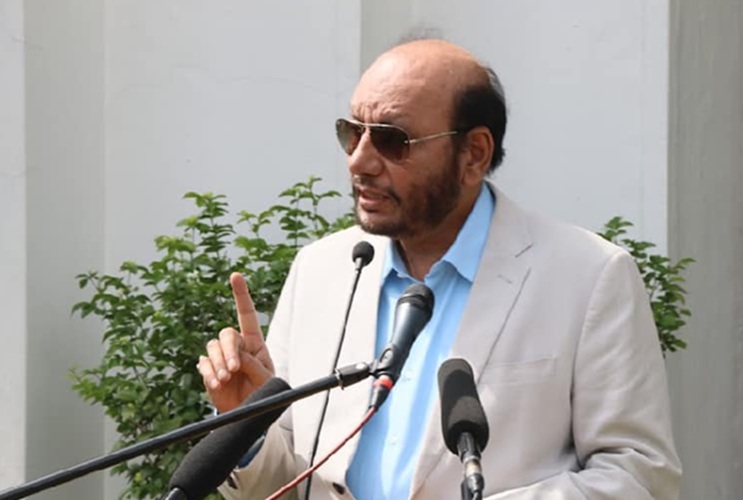
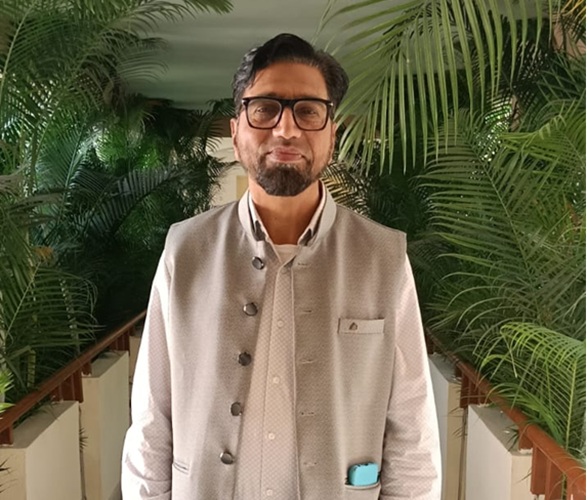
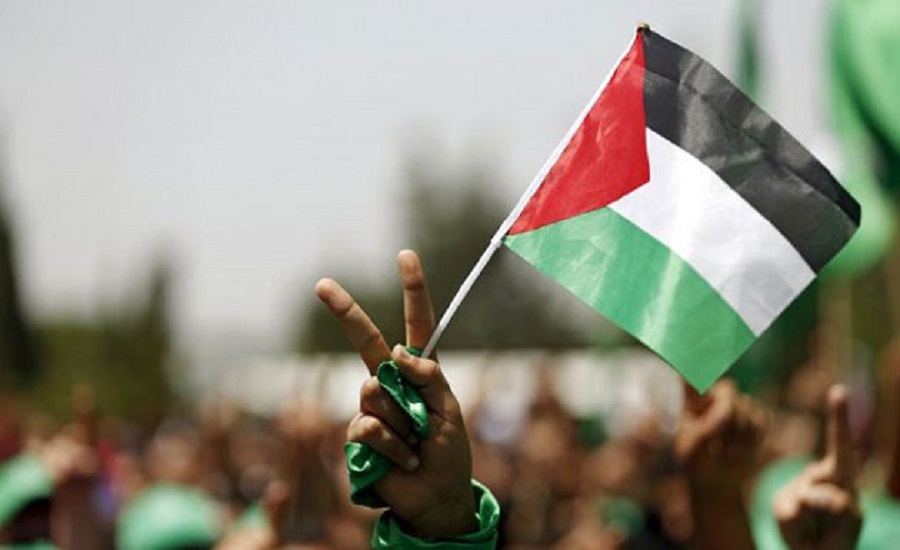
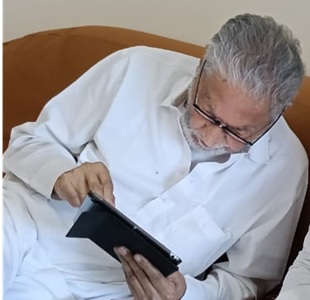
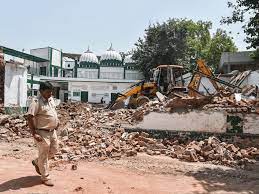
0 Comments